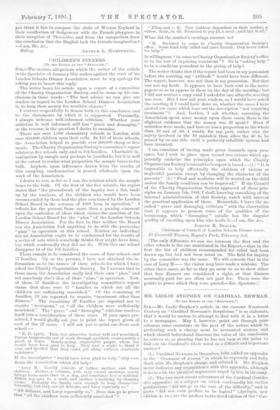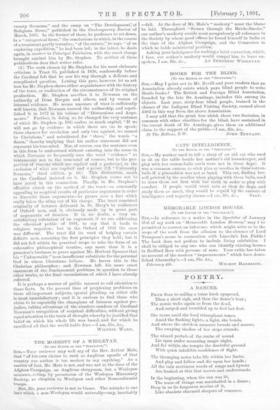MR. LESLIE STEPHEN ON, CARDINAL NEWMAN. [To Tao EDITOE OF
THE "Brxerkron."1 Sin,—Mr. Leslie Stephen's article in the current Nineteenth Century on " Cardinal Newman's Scepticism " is so elaborate, that it would be useless to attempt to deal with it in a letter to a newspaper. May I, however, point out through your columns some omissions on the part of the writer, which in preferring such a charge must be accounted serious, and which should beforehand discount the value of the conclusion he arrives at, as showing that he has not been at the pains to find out the.Cardinal's whole mind on a difficult and important matter ?
(1.) Cardinal Newman in December, 1880, added an appendix to the " Grammar of Assent " in which lie expressly and fully dealt with Mr. Stephen's charge, and refuted it. Mr. Stephen never indicates any acquaintance with this appendix, although it deals with the identical arguments urged by him in his essay.
(2.) The two most recent utterances of the Cardinal (besides this appendix) on a subject on which confessedly his earlier publications " did not go to the root of the difficulty," and in parts "did not even profess to be logical" (Apologia, new edition, p. xx.) are the preface to the third edition of the " Uni versity Sermons," and the essay on " The Development: of Religious Error," published in the Contemporary Review of March, 1885. In the former of these, he professes to set down, in a " categorical form," the conclusions to which, in the course of a treatment partly tentative, "of the nature," he says, " of an exploring expedition," be bad been led; in the latter, he deals again, in answer to Principal Fairbairn, with the exact charge brought against him by Mr. Stephen. To neither of these publications does that writer refer.
(3.) The work chosen by Mr. Stephen for his most elaborate criticism is Tract 85, published in 1838, confessedly before the Cardinal felt that he saw his way through a delicate and complicated question. Letting this pass, however, let us ask how far Mr. Stephen shows either acquaintance with the history of the tract, or realisation of the circumstances of its original production. Mr. Stephen ascribes it to Newman on the authority of Dean Burgon and others, and by reason of internal evidence. He seems unaware of what is sufficiently well known, that Newman avowed the authorship, and repub- lished it in 1872 in his volume of "Discussions and Argu- ments." Further, in doing so, he changed the very sentence of which Mr. Stephen (p. 186) makes so much capital, " If we will not go by evidence in which there are (so to speak) three chances for revelation and only two against, we cannot be Christians," and substituted for "three," the words "a dozen," thereby implying that his earlier statement did not represent his true mind. Nor, of course, can the sentence even in this form be understood without entering into the sense in which Newman so frequently uses the word " evidence " as tantamount not to the sum-total of reasons, but to the pro- portion of reasons which are explicit and a posteriori, to the exclusion of what are implicit and a priori (Cf. " University Sermons," third edition, p. xii.) This distinction, much as the Cardinal insisted on it, Mr. Stephen seems not to have noted in this connection. Finally, in Mr. Stephen's effective attack on the method of the tract—as constantly appealing to sceptical results of particular arguments in order to discredit those arguments—he passes over a fact which really takes the sting out of his charge. The tract consisted originally of lectures delivered in St. Mary's to audiences of Oxford men, and is obviously made up in great part of arguments ad homines. It is, no doubt, a very un- satisfactory refutation of an argument, if we are addressing the educated public of 1891, to say that it leads to religious negation ; but in the Oxford of 1838 the case was different. The tract did its work of helping certain definite men, assuming the first principles they held ; but it did not fall within its practical scope to take the form of an exhaustive philosophical treatise, any more than it is a preacher's business to prove against Mr. Herbert Spencer that his " Unknowable " is an insufficient substitute for the personal God in whom Christians believe. He leaves this to the Christian philosopher; and Newman left his more exact statement of the fundamental problems in question to those other works, to the final emendations of which I have already referred.
It is perhaps a matter of public interest to call attention to these facts. In the present time of perplexing problems on these all-important subjects, special pleading on either side is most unsatisfactory ; and it is curious to find those who claim to be especially the champions of fairness against pre- judice, taking advantage of the absolute candour of Cardinal Newman's recognition of sceptical difficulties, without giving equal attention to the train of thought whereby he justified that belief on which his whole life was based, and for which be sacrificed all that the world holds dear.—I am, Sir, &c., WILFRID WARD.











































 Previous page
Previous page